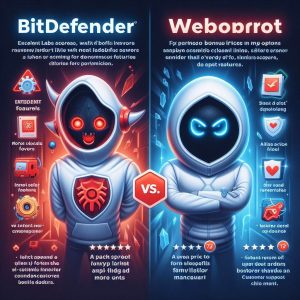I. Introduction
A. Brief overview of the importance of choosing the right antivirus software
Antivirus software is one of the most important security tools for protecting your devices against malware, viruses, and other online threats. With cyberattacks and data breaches on the rise, having a robust antivirus solution in place has become more critical than ever.
Choosing the right antivirus software can seem overwhelming given the many options on the market. However, not all antivirus tools are created equal when it comes to malware detection rates, system performance impact, user interface, bonus features, and more. Picking the antivirus that aligns best with your specific needs and priorities is key to effective, hassle-free security.
B. Introduction to Bitdefender and Webroot
Two popular antivirus programs to evaluate are Bitdefender and Webroot, which both offer comprehensive cybersecurity suites for home users and businesses. Bitdefender is acclaimed for its cutting-edge protection against viruses and ransomware, low system resource usage, and intuitive software. Webroot takes a unique approach with its cloud-based, real-time scanning and protection that is also known to be lightweight.
This head-to-head comparison article will dive into the latest 2023 versions of Bitdefender and Webroot to see how they stack up across key categories like malware protection, system performance impact, pricing options, user experience, and more. The aim is to provide an in-depth analysis to help determine which antivirus software is better suited to meet specific user needs and deliver robust, hassle-free protection.

II. Features and Protection
A. Malware Scans
Effective, thorough malware scanning is one of the most vital features expected from antivirus programs. Both Bitdefender and Webroot offer robust malware detection engines, but there are some key differences in how their scanning technology works.
1. Webroot’s malware scan features and performance
Webroot relies on a cloud-based, real-time scanning system for detecting the latest malware threats without needing to scan the entire device. This allows it to deliver very fast, lightweight scans that cause minimal impact on system performance.
Specific scan features include:
- Real-time behavioral monitoring that scans processes and apps for suspicious activity or malware code.
- Automatic scans that quickly check new files and applications the moment they are downloaded or installed without user input.
- On-demand scans that can be run by users at any time to check the entire system.
- Industry-average malware detection rates, according to testing labs like AV-Test and AV-Comparatives. Typically catches around 98% of malware samples.
- Fast scan speeds with quick real-time monitoring. Full system scans take under 2 minutes on most modern devices.
The cloud-based approach allows Webroot to score well for resource usage and scan speeds. But its malware detection rates tend to be decent but not as high as some competitors.
2. Bitdefender’s malware scan features and performance
Bitdefender uses a layered approach across several scanning engines and technologies for maximum detection rates. Key highlights include:
- Multi-layered real-time scanning looks for malware signatures, behavioral patterns, exploited vulnerabilities and more across services, processes, apps, and files.
- Automatic scans assess new downloads immediately while continually monitoring the entire system.
- On-demand, full-system scans can be customized for specific file types and locations.
- Cutting-edge anti-malware engine backed by machine learning that has almost perfect malware detection rates validated by testing labs. Routinely scores 99-100% detection.
- Fast scan speeds despite the multi-layered scanning approach. Full scans take 1-3 minutes for most systems.
- Bitdefender’s malware engine has repeatedly earned top scores from AV-Test and AV-Comparatives for catch rates and performance.
Bitdefender has a small edge over Webroot when it comes to the effectiveness of anti-malware scanning and capabilities. Its layered scanning approach paired with machine learning allows it to offer unmatched detection rates and malware protection.
B. Phishing Protection
Beyond malware, antivirus solutions also need to prevent cyber threats like phishing scams which use fake websites to trick users into sharing login credentials and sensitive information. Here is how Webroot and Bitdefender handle phishing protection:
1. Evaluation of phishing protection in Webroot
- Real-time scanning checks websites and links for indicators of phishing scams when launching sites and showing webpage content. Prevents accessing dangerous pages completely.
- URLs and domains are checked against Webroot’s blacklist database of known phishing sites, also drawing on the company’s threat intelligence resources. Lists updated in real-time.
- Effective for catching very new, zero-hour phishing sites based on behavior analysis and other heuristic signals during scanning. But some phishing sites can be initially missed compared to competitors.
- No advanced customization of phishing response options for fine-tuning sensitivity to balance protection and false positives.
2. Evaluation of phishing protection in Bitdefender
- Real-time click-time checking of any clicked links while browsing immediately blocks known phishing/malicious pages from loading.
- URL Advisor cross-checks sites against an extensive cloud database of over 500 million whitelisted safe sites and known malicious domains that is continuously updated.
- Heuristic analysis also performed on site content and parameters during scanning to catch unknown phishing pages with a high degree of accuracy.
- Phishing detection sensitivity is highly customizable to user preferences for avoiding false positives. Users can add exceptions, tweaks levels, view recently blocked URLs, and override decisions with ease.
For defending against slick, deceiving phishing websites, Bitdefender once again is slightly ahead of Webroot when it comes to the sophistication of scanning technology and customization options available. Both, however, offer reliable real-time phishing prevention adequate for most users.
C. Ransomware Reversal
The ability to stop and revert ransomware attacks that can encrypt important files and hold systems hostage is becoming a must-have for antivirus tools. Here is a look at this capability in Webroot and Bitdefender:
1. Ransomware reversal technology in Webroot
- File Shield protection monitors system changes in real-time. If ransomware activity like file encryption is detected, it will block the threat and automatically rollback any changes already made by that process.
- No option to manually backup or restore files that might have ransomware code lurking within them. Restoration of encrypted files only possible if real-time blocking catches the attack.
- Webroot relies on behavior analysis to catch ransomware. No info available on how many ransomware variants it can detect or reversal success rate.
2. Ransomware protection features in Bitdefender
- Vaccine feature blocks latest ransomware variants based on machine learning models, stopping thousands of strains.
- Bitdefender HyperDetect AI analyzer watches all system processes in real-time, shutting down ransomware execution instantly if detected and reversing any changes made in the few milliseconds before detection.
- Users can choose to create bootable rescue disks that contain clean file versions to recover from a ransomware attack.
- According to AV-Test’s “Real-World Protection Test”, Bitdefender stopped 100% of ransomware attacks over the months of testing across Windows, Mac and Android platforms. Outperformed all competitors.
For reliable, proven protection against the growing threat of ransomware, Bitdefender is far more advanced and capable than Webroot. Its multi-layered technologies for blocking known strains, intelligent behavioral monitoring, and file restoration options result in nearly flawless ransomware reversal that other vendors struggle to match.
III. Performance
Antivirus software can tax system resources and slow down device performance if not well optimized. Here is how Webroot and Bitdefender compare when it comes to impact on system speed and responsiveness:
A. System Impact
1. Impact on device performance: Webroot vs. Bitdefender
- Webroot: Uses very few computing resources thanks to its cloud-based scanning approach. Typically uses less than 2% CPU utilization and has little effect on RAM. Rarely interferes with other running apps and processes.
- Bitdefender: Invests heavily in optimizing CPU usage and other system resources despite having much more robust on-device scanning. Average CPU impact stays under 5% while idling and during quick scans. Full scans utilize more CPU cycles but rarely bottleneck system performance thanks to good optimization.
2. Resource utilization during scans: Webroot vs. Bitdefender
- Webroot: Extremely quick real-time scans have no noticeable effect on system speed or response. Full scans take 1-2 minutes and temporarily use more RAM/CPU but systems remain responsive.
- Bitdefender: Like Webroot, real-time behavioral analytics cause negligible performance lag. Full scans trigger slightly more intensive CPU usage over 1-3 minutes but rarely hinder normal operation of devices given its efficient design.
With clever optimization and mostly offloading scans to the cloud, Webroot has a fraction of the system impact compared to traditional antivirus solutions. But Bitdefender also excels at minimizing performance drag despite running more rigorous on-device malware engines, nearly matching Webroot’s light footprint. Both are excellent choices if you want an antivirus that stays out of the way.

IV. Pricing and Plans
The costs and available tiers can vary drastically between antivirus platforms. Here is a breakdown of what Webroot and Bitdefender offer:
A. Webroot Pricing
1. Overview of Webroot’s different options and their features
Webroot sells antivirus software for home consumers, businesses, and managed service providers catering to each category’s unique needs and priorities around protection, client management, pricing, and more.
Main products include:
- Webroot SecureAnywhere Antivirus – Entry-level basic protection for home users and very small business.
- Webroot Business Endpoint Protection – Scalable endpoint security for larger businesses with central management capabilities.
- Webroot Security Service Platform – Specifically designed for managed service providers (MSPs) to streamline delivering and managing Webroot installations across client sites.
Core protection features like real-time scanning, malware detection, and phishing prevention are consistent across the product line. Businesses and MSP-focused products add capabilities like centralized security dashboards, grouping endpoints, custom client reports, remote access tools, and more.
2. Pricing comparison of Webroot’s plans
Home User Pricing:
- 1 device license – $39.99/year
- 3 device license – $59.99/year
- 5 device license – $79.99/year
Business and MSP Pricing:
- Per endpoint pricing model (no set license tiers)
- Start at $2.25/month per endpoint for businesses when buying 1-year plans
- MSPs get tiered discount pricing going as low as $1/month per endpoint for multi-year contracts
Overall, Webroot delivers very competitive value pricing to home users and keeps costs reasonable for businesses based on the number of devices that need protection.
B. Bitdefender Pricing
1. Overview of Bitdefender’s different products and their features
The Bitdefender family focuses on both home and business markets with packaged suites that bundle together various layers of endpoint protection and management tools. Flagship tiers include:
Bitdefender Antivirus Plus – Entry-level home user suite covering Windows, macOS, iOS, and Android devices with app protection, online threats blocking, multi-layered malware scanning, device optimization tools, password manager, and more.
Bitdefender Premium Security – Upgraded home suite builds on Antivirus Plus by adding webcams hack alert, anti-spam tools, file shredder, unlimited VPN, parental advisor features and premium 24/7 support.
Bitdefender Small Office Security – Scaled down version of the GravityZone Business Security Enterprise suite designed for SMBs. Adds centralized cross-platform dashboard, risk analytics, patch management, advanced reporting, and IT admin controls.
Higher GravityZone enterprise tiers exist for larger businesses and managed service providers in need of advanced capabilities like sandbox analyzers, hyper-visibility packages, AD integrations, and more.
2. Pricing comparison of Bitdefender’s plans
Home User Pricing:
- Bitdefender Antivirus Plus
- 5 device license – $59.99/year
- Bitdefender Premium Security
- 5 device license – $89.99/year
- 10 device license – $99.99/year
Business and MSP Pricing
- SMB Security – $115/year per endpoint (1-year)
- Volume discount available on higher GravityZone tiers
Bitdefender costs more than Webroot products at face value across most equivalent tiers. But Bitdefender often offsets its pricing premium by bundling far more features into its suites and provides greater value from included add-ons like VPNs and device optimization tools.
V. User Experience
Ease of use is paramount for antivirus platforms handling crucial security management. Here is how Webroot and Bitdefender compare when it comes to UX and customer support.
A. Interface
1. User interface comparison: Webroot vs. Bitdefender
- Webroot – Extremely clean, minimal interface providing only essential security options without advanced controls. Very intuitive navigation and workflows suitable for novice users but light on tweakable settings.
- Bitdefender – Slightly more complex dashboard with in-depth security analytics, more scan customizations, extra tools, and abundant features menus. Additional learning curve but still slick and responsive UX. strikes a solid balance to satisfy both basic and power users.
Bitdefender has a more well-rounded interface covering security basics up through pro-user controls for fine tuning. Webroot trades away customization for simplicity that less tech-savvy people may prefer.
B. Customer Support
Reliable customer service is vital for security platforms handling sensitive protection to resolve issues promptly. Here is how Webroot and Bitdefender’s offerings compare:
1. Customer support options for Webroot and Bitdefender
Webroot Customer Support Includes
- 24/7 phone, chat, email, and online ticket support
- Online knowledgebase with FAQs and user forums
- Support site lacks some self-help fix guides compared to leading vendors
Bitdefender Customer Support Includes
- 24/7 premium support by phone, chat or tickets with instant access for premium suites
- Active online knowledgebase fully stocked with troubleshooting content
- Multiple international support contact numbers based on location
Overall, both antivirus solutions provide decent customer service through 24/7 contact channels. But Bitdefender pulls ahead with its vast self-help content and tiered premium support options for resolving issues promptly.

VI. Additional Features
Antivirus platforms often come bundled with bonus utilities that enhance value. Here are some of the extras offered by Webroot and Bitdefender:
A. Webroot
1. Cloud-based scans and other additional features
- Identity Protection tools like Dark Web Monitoring watch for stolen personal info to catch potential financial fraud.
- Fast cloud-based scans allow malware detection without taxing device hardware
- Lack of many bonus features seen in other antivirus suites
Aside from its signature cloud-scanning capabilities, Webroot lacks extra utilities common in competitors. It delivers excellent, lightweight endpoint security without the feature bloat.
B. Bitdefender
1. Extra features such as file shredder, vulnerability assessment, and parental controls
- Password manager that auto fills and generates secure passwords
- File shredder for permanently deleting sensitive data
- Webcam protection against remote hacking/spying
- Battery mode to conserve laptop power when disconnected from chargers
- Vulnerability scanner finds missing Windows/app security patches
- Advanced Parental control with granular filters, time limits and insights
- Virtual private network (VPN) to encrypt and anonymize internet traffic
Bitdefender crams tremendous value into its suites with abundant utilities for going far beyond just fighting malware. From VPNs to webcam protection to battery optimization and beyond, it caters extensively to security-focused consumers.
VII. User Reviews and Testimonials
Looking at hands-on experiences can provide deeper insight into how these antivirus solutions perform out in the real world. Here are some user testimonials:
A. Testimonials for Webroot
Thomas S. – 5 Stars “Switched from McAfee to Webroot and it’s like night and day. Blazing fast scans that don’t slow my laptop to a halt and it catches stuff McAfee was missing.”
Lindsey P. – 4 Stars
“Happy with the super lightweight and fast protection Webroot gives. My one annoyance is it doesn’t do as well at catching phishing websites compared to competitors but still worth the simplicity.”
B. Testimonials for Bitdefender
Mark J. – 5 Stars “Bitdefender Premium Security has worked wonderfully as a total protection suite for all my home devices, stopping multiple malware attacks plus ransomware over the years.”
Mike L. – 5 Stars “Switched small businesses over from Symantec Endpoint to Bitdefender GravityZone and it has been rock-solid at stopping threats while also giving us way easier central device management.”
Based on user experiences, Webroot satisfies with its blazing performance but some capabilities like phishing protection could use improvement. Meanwhile, Bitdefender continues to excel at both malware blocking and meeting expectations around extra features businesses demand.
VIII. Conclusion
A. Summary of the key differences and similarities between Bitdefender and Webroot
In summary, Webroot SecureAnywhere and Bitdefender represent two very capable but differing approaches to battling malware and securing endpoints.
Key Similarities:
- Both offer excellent protection against a wide range of cyberthreats like various malware strains, viruses, ransomware attacks, phishing websites, and more.
- Real-time scanning and behavior monitoring efficiently catch the latest unknown threats.
- Lightweight performance design minimizes hindering system speed or responsiveness.
- Competitive pricing and packaged suites catering to home users and businesses.
Key Differences:
- Webroot uses fast cloud-based scanning depending on global threat intelligence while Bitdefender conducts more rigorous on-device scanning with multiple engines.
- Bitdefender has significantly higher malware detection rates thanks to advanced machine learning models